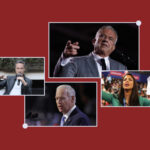Arab American leaders in Dearborn, Michigan have expressed their disappointment with Vice President Kamala Harris’ handling of the conflict in Gaza and her close alignment with President Joe Biden’s support for Israel. Despite warnings from the community, Harris failed to distance herself from Biden’s stance, leading to a significant backlash among Arab American voters.
The community felt ignored and insulted by Harris’ actions, such as refusing to host a Palestinian American speaker at the Democratic National Convention and dismissing protesters who criticized her support for Israel. As the death toll in the Middle East rose, Arab Americans in Dearborn felt betrayed by Harris and the Biden administration.
In the aftermath of the election, it became clear that many Arab American residents in Dearborn had shifted their support away from the Democratic Party. President-elect Donald Trump received a substantial share of votes in the city, with Harris experiencing a significant drop in support compared to Biden’s win in 2020. The community’s protest vote extended beyond Arab Americans, with progressives and college students joining in the anti-war sentiment.
Despite the shift towards Trump, Arab American leaders emphasize that this does not signal a permanent realignment with the Republican party. Rather, it reflects a rejection of Biden and Harris specifically. While Trump’s social conservatism and isolationist foreign policy resonated with some in the community, many still identify as part of the Democratic base.
Harris’ handling of the conflict in Gaza, her refusal to engage with Palestinian American voices, and her campaign’s missteps in Michigan further alienated Arab American voters. Trump capitalized on this discontent, reaching out to the community and promising a different approach to peace in the Middle East.
In the final days of the campaign, Harris failed to connect with Arab American voters, while Trump’s messaging resonated with many in Dearborn. The community was divided on how to express their political anguish, with some choosing to skip voting in the presidential race altogether. Despite the divisions, the community’s united grief over the conflict in Gaza underscored the need for meaningful change in U.S. foreign policy.
As Dearborn grapples with the aftermath of the election, Arab American leaders are calling for a reevaluation of U.S. policy in the Middle East and a more inclusive approach to engaging with diverse communities. The shift towards Trump in this election serves as a wake-up call for the Democratic Party to listen to the concerns of Arab Americans and address their grievances in a meaningful way.







